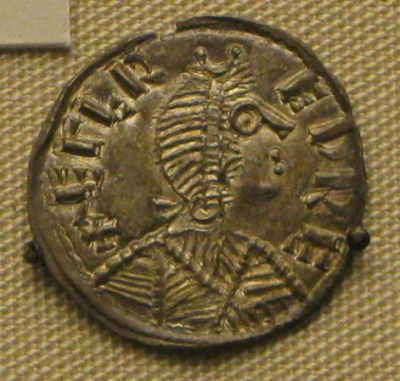The Battle of Ashdown, was a West Saxon victory over a Danish Viking army on about 8 January 871. The location of Ashdown is not known, but may be Kingstanding Hill in Berkshire. Other writers place the battle near Starveall, a short distance north of the village of Aldworth and south east of Lowbury Hill.The West Saxons were led by King thelred and his younger brother, the future King Alfred the Great, while the Viking commanders were Bagsecg and Halfdan. The battle is described in the Anglo-Saxon Chronicle and Asser's Life of King Alfred.By 870, the Vikings had conquered two of the four Anglo-Saxon kingdoms, Northumbria and East Anglia. At the end of 870 they launched an attempt to conquer Wessex and marched from East Anglia to Reading, arriving on about 28 December. Three days after their arrival they sent out a large foraging party, which was defeated by an army of local levies under the command of thelwulf, Ealdorman of Berkshire, at the Battle of Englefield, but only four days later the main West Saxon army under thelred and Alfred was defeated at the Battle of Reading.Four days later, on about 8 January, the armies fought again at Ashdown. The Vikings arrived first at the battle ground and deployed along the top of the ridge, giving them the advantage. They divided their forces into two contingents, one under their kings, Bagsecg and Halfdan, the other under their earls. When the West Saxons heard this from their scouts, they decided to copy the formation, with thelred facing the kings and Alfred the earls. The king then retired to his tent to hear Mass, while Alfred led his forces to the battlefield. Both sides formed their forces into shield walls. thelred would not cut short his devotions and Alfred risked being outflanked and overwhelmed by the whole Danish army. He decided to attack and led his men in a charge up hill. Battle then raged around a small thorn tree and finally the West Saxons were victorious. Although both the Anglo-Saxon Chronicle and Asser emphasise Alfred's role in the victory, in the view of Richard Abels it was the attack by thelred when he joined the battle which was decisive and he may have intended all along to take the Vikings unawares. They suffered heavy losses, including King Bagsecg and five earls, Sidroc the Old, Sidroc the Younger, Osbern, Frna, and Harold. The West Saxons pursued the fleeing Vikings until nightfall, cutting them down. However, victory proved short-lived, as it was followed by two defeats, at Basing and Meretun. Soon after Easter, which fell on 15 April in that year, thelred died and was succeeded by Alfred.
The Battle of Ashdown can be dated because Bishop Heahmund of Sherborne died in the Battle of Meretun, and it is known that he died on 22 March 871. The Anglo-Saxon Chronicle records that the Battle of Basing was two months earlier, dating it to 22 January, Ashdown fourteen days before that on 8 January, Reading four days earlier on 4 January, Englefield another four days earlier on 31 December 870 and the arrival of the Vikings in Reading three days earlier on 28 December. However, as the two month interval between Meretun and Basing is probably not exact, the earlier dates are approximate.
Alfred the Great (alt. Ælfred 848/849 – 26 October 899) was King of the West Saxons from 871 to c. 886 and King of the Anglo-Saxons from c. 886 until his death in 899. He was the youngest son of King Æthelwulf and his first wife Osburh, who both died when Alfred was young. Three of Alfred's brothers, Æthelbald, Æthelberht and Æthelred, reigned in turn before him. Under Alfred's rule, considerable administrative and military reforms were introduced, prompting lasting change in England.After ascending the throne, Alfred spent several years fighting Viking invasions. He won a decisive victory in the Battle of Edington in 878 and made an agreement with the Vikings, dividing England between Anglo-Saxon territory and the Viking-ruled Danelaw, composed of northern England, the north-east Midlands and East Anglia. Alfred also oversaw the conversion of Viking leader Guthrum to Christianity. He defended his kingdom against the Viking attempt at conquest, becoming the dominant ruler in England. Details of his life are described in a work by 9th-century Welsh scholar and bishop Asser.
Alfred had a reputation as a learned and merciful man of a gracious and level-headed nature who encouraged education, proposing that primary education be conducted in Old English rather than Latin and improving the legal system and military structure and his people's quality of life. He was given the epithet "the Great" in the 16th century.

 English
English  español
español  français
français  português
português  русский
русский  العربية
العربية  简体中文
简体中文 
